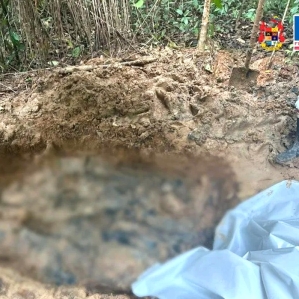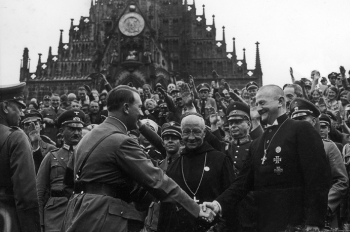
Authorities in Colombia on Tuesday (July 1) discovered a mass grave containing the bodies of eight Christian leaders in Calamar, Guaviare Department, according to the attorney general’s office.
The Christian leaders, originally from Arauca Department, were carrying out humanitarian and spiritual work in that region when they disappeared. They had been summoned in early April by Revolutionary Armed Forces of Colombia (FARC) militants, specifically the Armando Ríos Front under a rebel leader known as Iván Mordisco, before their disappearance, according to initial reports from the attorney general’s office.
The killings were said to have intended to help block the emergence of a cell of a rival rebel National Liberation Army (ELN) cell, though authorities found no evidence of links between the victims and guerrilla group.
The bodies were identified as those of James Caicedo, Óscar García, Máryuri Hernández, Maribel Silva, Isaid Gómez, Carlos Valero, Nixon Peñaloza and Jesús Valero, all members of Evangelical Denominations of the Alliance of Colombia (DEAC) and the Foursquare Church.
According to Christian Solidarity Worldwide (CSW), Peñaloza was DEAC treasurer; Gómez and his wife Silva were preachers who leave behind two small children; Caicedo, a former pastor of the Foursquare Church (ICCG), had continued ministering in the area.
“All of them had fled Arauca years ago due to threats, church closures, and attacks on pastors by armed groups,” CSW noted after their initial disappearance on April4-5.
The discovery of the mass grave resulted from the capture of a guerrilla in May whose cell phone contained photographs of the detained leaders and, later, of the crime, making it possible to locate the grave and proceed with its exhumation.
Because Christians oppose Colombia’s powerful drug cartels and guerrilla groups, they are often singled out for attack, according to Open Doors’ 2025 World Watch Report of the 50 countries where it is most difficult to be a Christian.
“Church leaders are particularly at risk because they are seen as competing for influence over the young people who are often targeted for recruitment by guerrilla groups,” the Christian support group noted. “In some indigenous communities, Christian preachers and indigenous converts can face intense hostility because they are seen as traitors who have betrayed their tribe or community.”
Colombia is ranked 46th on the 2025 WWL.
The Evangelical Confederation of Colombia (CEDECOL) issued a strong condemnation of the crime and solidarity with the victims’ families and Christian communities mourning the loss.
“We ask for prayers for peace and consolation for these families,” the CEDECOL statement read. “We raise a firm voice of cry and demand that the authorities ensure that these crimes do not go unpunished, that the investigations move forward swiftly, and that real guarantees are provided for the protection of the lives and integrity of those who exercise spiritual leadership in the most vulnerable regions of the country.”
CEDECOL also reaffirmed its commitment to the defense of life, truth, justice, and peace in Colombia, and asked for prayers for the restoration of Colombia’s social fabric and consolation for those who have been struck by this tragedy. The statement concluded by recalling Matthew 5:10, “Blessed are those who are persecuted for righteousness’ sake, for theirs is the kingdom of heaven.”
Presidential Condemnation
Colombian President Gustavo Petro condemned the murder, calling it a serious human rights violation. He urged the strengthening of state and security presence in territories historically affected by the armed conflict.
The daughter of one of the victims told SEMANA newspaper that the Petro administration should be “present and to avoid these types of situations, because currently two armed groups are fighting over territory, and the peasantry is caught in the middle, and there is no response from the state, no protection from the state. In other words, we are truly alone in a war between two armed groups.”
International organizations such as the U.N. High Commissioner for Human Rights (UNHCR) also spoke out, warning that such crimes “silence essential voices” in communities and deepen the humanitarian crisis in rural areas.
The mayor of Calamar said the population feels “alone” and urged the government to intervene rather than be distracted by festivities. He demanded immediate attention to the serious security crisis facing his community, according to El País.
Public order remains problematic as officials do nothing because rebels threaten even mayors of municipalities within the department, he said.
The killings make up the largest massacre this year in Colombia, according to the Institute for Development and Peace Studies (Indepaz). More than 30 multiple homicides have been recorded in rural areas, especially in regions where there are territorial disputes between FARC dissidents and the ELN.
Guaviare has been the scene of recurring clashes between the groups of rebel leaders Mordisco and another known as Calarcá. In January 20 bodies were reported to have arrived at a morgue after fierce fighting, exposing the alarming vulnerability of social and religious leaders in regions controlled by illegal armed groups.





